|
|
|
Sort Order |
|
|
|
Items / Page
|
|
|
|
|
|
|
| Srl | Item |
| 1 |
ID:
177662
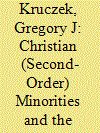

|
|
|
|
|
| Summary/Abstract |
This article explores how a second-order minority, northern Iraq’s Christians, mobilized to protect homelands during state breakdown and state recalibration. It examines how an Iraqi Christian political party, the Assyrian Democratic Movement (ADM), responded to the rise and spread of the Islamic State. More specifically, it analyzes the ADM’s creation of a self-defense force, the Nineveh Plains Protection Units (NPU), and how the party positioned itself for the post-conflict state. Ethnographic fieldwork conducted in Iraq combined with existing primary and secondary sources reveals a detailed process whereby notions of historic homelands were manipulated around security threats and a legacy of distrust of both the central government and Kurdistan Regional Government to drive mobilization. The name “Nineveh Plains Protection Units” also served a strategic purpose. A territorial-based identity connected contemporary Christians to an ancient Mesopotamian past. Combined with a shared Christian faith, this served to supersede intragroup/sectarian cleavages and “the ethnic Assyrian debate” without rejecting them. It also acted as a bridge to the country’s other ethno-sectarian groups, finding a way to assert Assyrian and Christian belonging within and to Iraq. Nevertheless, mobilization and the long-term goal of self-determination in the Nineveh Plain were both ultimately contingent upon allying with either Baghdad or Erbil. Although the ADM chose Baghdad, it was left alone to navigate the Nineveh Plain’s position within the Kurdistan independence referendum.
|
|
|
|
|
|
|
|
|
|
|
|
|
|
|
|
| 2 |
ID:
177661
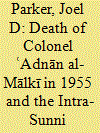

|
|
|
|
|
| Summary/Abstract |
This article reconsiders the simple minority-majority dichotomy that surrounded the death of Colonel ʿAdnān al-Mālkī who was a Sunni killed by an ʿAlawi in 1955. Nevertheless, it was not the ʿAlawi minority, or other non-Sunni minorities that drove the subsequent power struggle that arose in Syria. Rather what occurred was a battle for control of the identity, direction, and economic organization of the young state contested by two alternative networks of Sunni elites, namely ʿulemaʾ (religious-scholarly) families, and ʿaskerī (military-administrative) families, both of whose social origins can be found in Ottoman history. This study argues that al-Mālkī’s assassination temporarily weakened the Syrian ʿulemaʾ families’ position in the civil-military balance that undergirded Syrian society and allowed the ʿaskerī class to gain the initiative. Such a change is evidenced by Damascus’s turn toward the Soviet Union for arms as well as other state-building materials. The inability of these two competing internal networks to resolve their differences throughout the Cold War resulted in political dysfunction throughout the Cold War era. The ascent of Gamal ʿAbd al-Nasser to power with the creation of the United Arab Republic in 1958 proved a temporary abeyance in this struggle, but a final resolution came only much later when Hafez al-Assad became leader in 1970.
|
|
|
|
|
|
|
|
|
|
|
|
|
|
|
|
| 3 |
ID:
177660
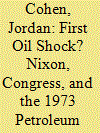

|
|
|
|
|
| Summary/Abstract |
This article investigates whether the United States had prior knowledge of the 1973 oil crisis instituted by Arab countries in 1973. It argues, using predominantly primary source documents, that as early as 1971, Washington understood the Arab nations were willing to use oil as an economic weapon. Furthermore, government officials had drafted contingency plans to ameliorate the enormous deleterious economic impact. Unfortunately, the gridlocked Congress and the erosion of executive power associated with the unfolding of the Watergate scandal thwarted any possibility of the Nixon Administration’s economic response to these developments being implemented. This article contributes new primary source research and contextualizes the crisis within the framework of a gridlocked Congress to add to the existing debate concerning America’s preparations for and failure to respond to the 1973 oil crisis.
|
|
|
|
|
|
|
|
|
|
|
|
|
|
|
|
| 4 |
ID:
177658
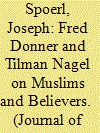

|
|
|
|
|
| Summary/Abstract |
Fred Donner contends that Muḥammad (c. 570–632) led an ecumenical movement of “believers,” a term used frequently in the Qur’ān which Donner defines as a generic term that included Jews and Christians as well as former polytheists who followed Muḥammad’s newly-proclaimed koranic prescriptions. In Donner’s view, only several generations after Muḥammad’s death did this movement come to call itself “Islam” and its members “Muslims” in the sense of a confessional identity over and against Judaism and Christianity. Tilman Nagel argues, to the contrary, that Muḥammad’s movement was neither ecumenical nor inclusive and that it had a distinct confessional identity from the outset with which it self-consciously set itself apart from Judaism and Christianity. For Nagel, “believers” are a subset of Muslims, which was distinguished by their willingness to wage religious war under Muḥammad’s command against polytheists, Jews, and Christians. Nagel’s understanding of the Muslim/believer distinction better accords with the relevant koranic verses than does Donner’s. It also accords far better with the earliest biographies of Muḥammad. Moreover, Nagel’s thesis accounts for all of the data that Donner’s thesis seeks to explain without raising the further problems that plague Donner’s revisionism.
|
|
|
|
|
|
|
|
|
|
|
|
|
|
|
|
| 5 |
ID:
177659
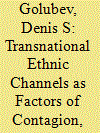

|
|
|
|
|
| Summary/Abstract |
The article raises the issue of why some transnational ethnic groups (TEGs) in the Middle East and North Africa (MENA) region are more effective transmitters of conflict and instability across established borders than others. The cases involving Kurds and Amazighs present some interesting variations of agency for both groups with regard to the external expansion of internal conflicts in some of the countries of their residence. A comparative analysis of the divergent experiences of Kurds and Amazighs with respect to contagion, internationalization (mostly through intervention), and what one might term the “proxyfication” of relevant conflicts in the region reveals some underlying factors that help construct the author’s main argument and working hypotheses for the large-N empirical part of this study. What emerges is strong empirical support for the proposition that four characteristics of MENA-based TEGs – namely, group discrimination, the relative size of the group, the ethnic polarization of the group’s state of residence, and the group’s territorial concentration – all to some extent serve as factors of external expansion of internal ethnic conflict. Out of these four features, group discrimination and the territorial concentration of the group, which are the factors about which the Kurds and Amazighs appear to differ the most, turn out to be the most reliable predictors of TEG-based conflict expansion.
|
|
|
|
|
|
|
|
|
|
|
|
|
|
|
|
|
|
|
|
|